Healthcare: Herzberg's Two-Factor Theory and Supervisor Performance
VerifiedAdded on 2023/01/16
|9
|2309
|70
Essay
AI Summary
This essay delves into Herzberg's Two-Factor Theory, examining its relevance within a healthcare context and its implications for effective supervision. The paper introduces the theory, differentiating between motivators and hygiene factors, and explores how these elements influence employee motivation and job satisfaction. The author, in the context of the essay, discusses how they can apply the theory to improve their supervisory skills, focusing on eliminating job dissatisfaction through hygiene factors and enhancing job satisfaction through motivators. The essay also addresses criticisms of the theory, such as its failure to account for individual differences, and suggests strategies for overcoming these limitations, including the use of emotional intelligence and tailored motivational approaches. Ultimately, the paper concludes that the two-factor theory is a practical framework for supervisors, offering insights into how to foster a more engaged and productive healthcare workforce. The paper references several sources to support the analysis.
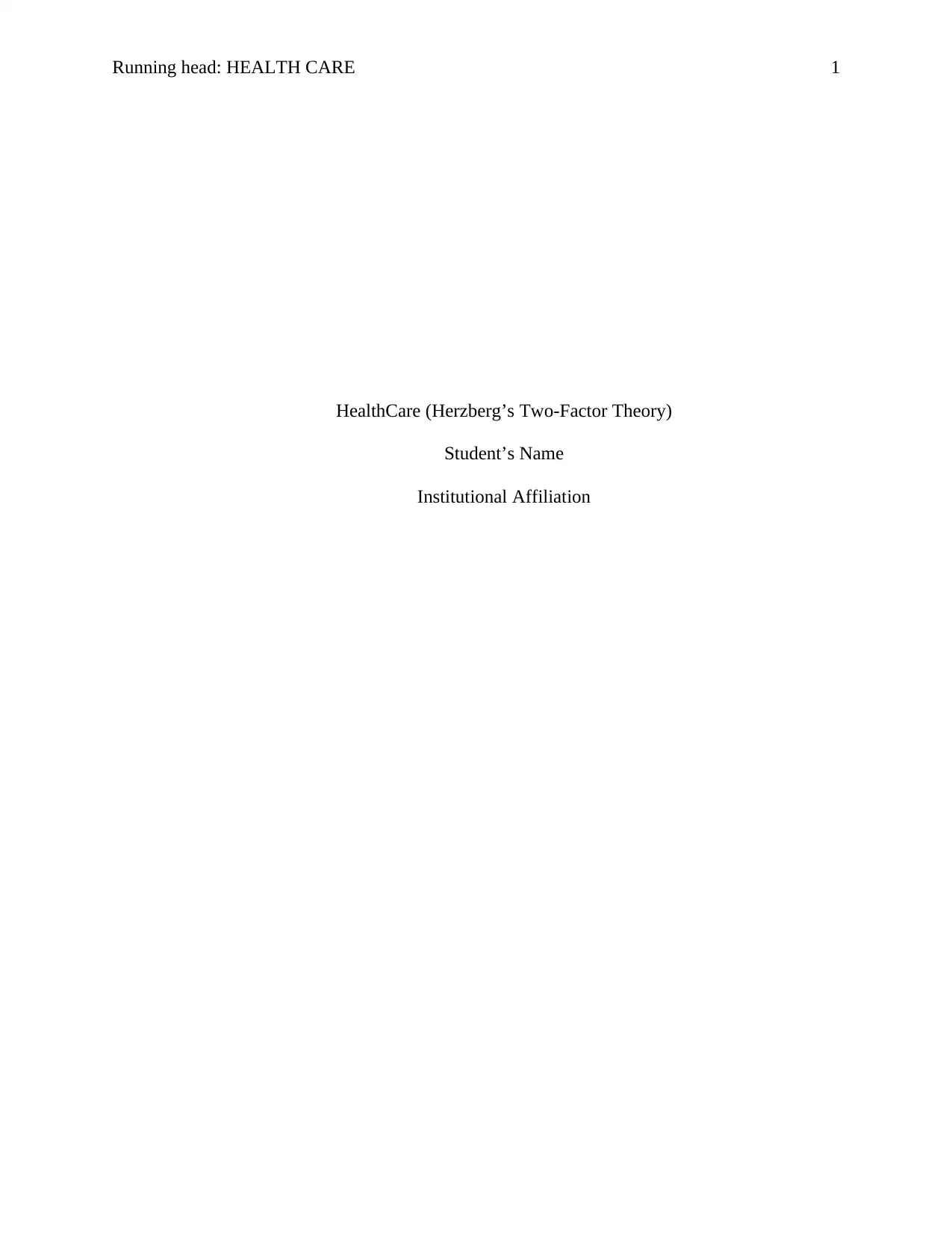
Running head: HEALTH CARE 1
HealthCare (Herzberg’s Two-Factor Theory)
Student’s Name
Institutional Affiliation
HealthCare (Herzberg’s Two-Factor Theory)
Student’s Name
Institutional Affiliation
Paraphrase This Document
Need a fresh take? Get an instant paraphrase of this document with our AI Paraphraser
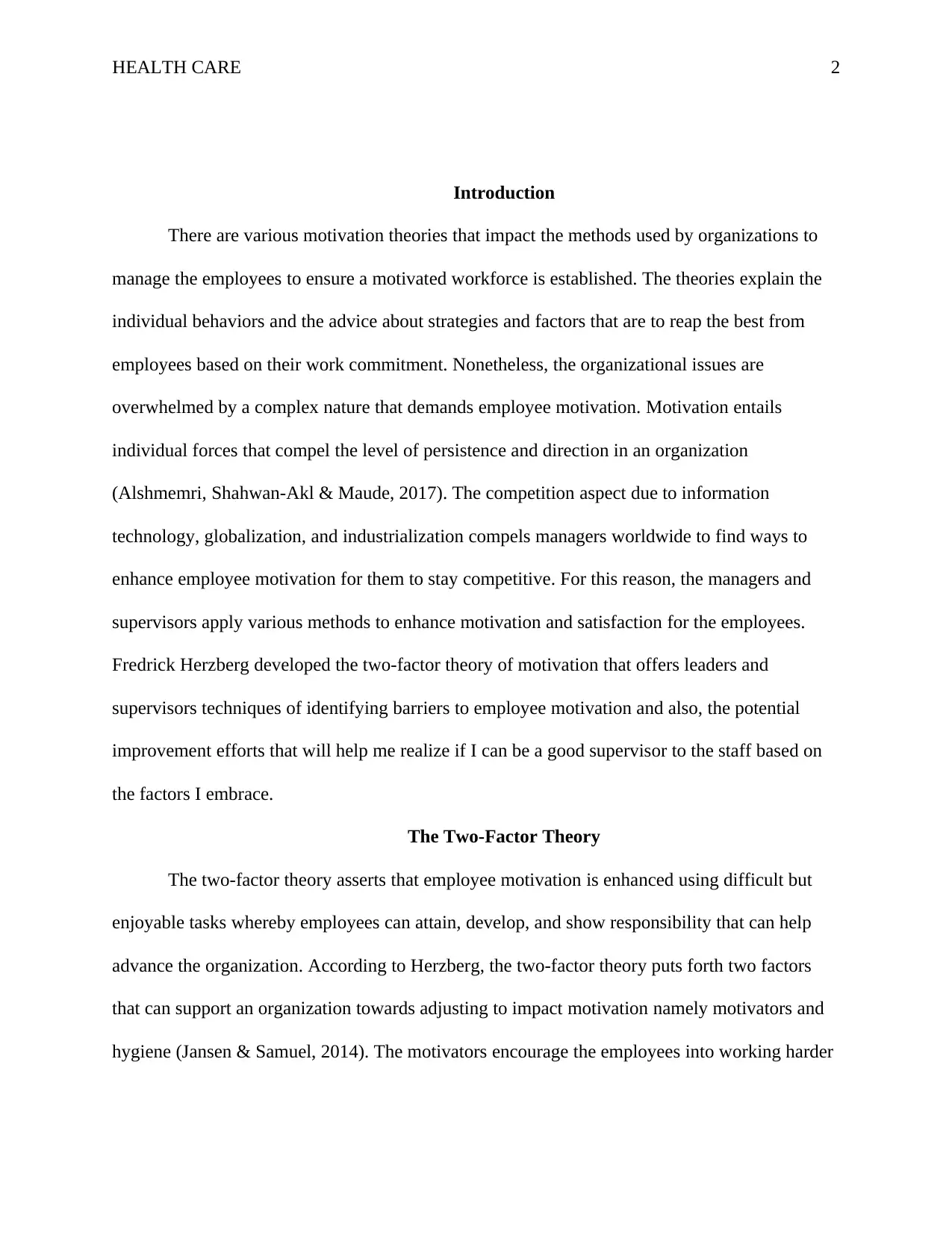
HEALTH CARE 2
Introduction
There are various motivation theories that impact the methods used by organizations to
manage the employees to ensure a motivated workforce is established. The theories explain the
individual behaviors and the advice about strategies and factors that are to reap the best from
employees based on their work commitment. Nonetheless, the organizational issues are
overwhelmed by a complex nature that demands employee motivation. Motivation entails
individual forces that compel the level of persistence and direction in an organization
(Alshmemri, Shahwan-Akl & Maude, 2017). The competition aspect due to information
technology, globalization, and industrialization compels managers worldwide to find ways to
enhance employee motivation for them to stay competitive. For this reason, the managers and
supervisors apply various methods to enhance motivation and satisfaction for the employees.
Fredrick Herzberg developed the two-factor theory of motivation that offers leaders and
supervisors techniques of identifying barriers to employee motivation and also, the potential
improvement efforts that will help me realize if I can be a good supervisor to the staff based on
the factors I embrace.
The Two-Factor Theory
The two-factor theory asserts that employee motivation is enhanced using difficult but
enjoyable tasks whereby employees can attain, develop, and show responsibility that can help
advance the organization. According to Herzberg, the two-factor theory puts forth two factors
that can support an organization towards adjusting to impact motivation namely motivators and
hygiene (Jansen & Samuel, 2014). The motivators encourage the employees into working harder
Introduction
There are various motivation theories that impact the methods used by organizations to
manage the employees to ensure a motivated workforce is established. The theories explain the
individual behaviors and the advice about strategies and factors that are to reap the best from
employees based on their work commitment. Nonetheless, the organizational issues are
overwhelmed by a complex nature that demands employee motivation. Motivation entails
individual forces that compel the level of persistence and direction in an organization
(Alshmemri, Shahwan-Akl & Maude, 2017). The competition aspect due to information
technology, globalization, and industrialization compels managers worldwide to find ways to
enhance employee motivation for them to stay competitive. For this reason, the managers and
supervisors apply various methods to enhance motivation and satisfaction for the employees.
Fredrick Herzberg developed the two-factor theory of motivation that offers leaders and
supervisors techniques of identifying barriers to employee motivation and also, the potential
improvement efforts that will help me realize if I can be a good supervisor to the staff based on
the factors I embrace.
The Two-Factor Theory
The two-factor theory asserts that employee motivation is enhanced using difficult but
enjoyable tasks whereby employees can attain, develop, and show responsibility that can help
advance the organization. According to Herzberg, the two-factor theory puts forth two factors
that can support an organization towards adjusting to impact motivation namely motivators and
hygiene (Jansen & Samuel, 2014). The motivators encourage the employees into working harder
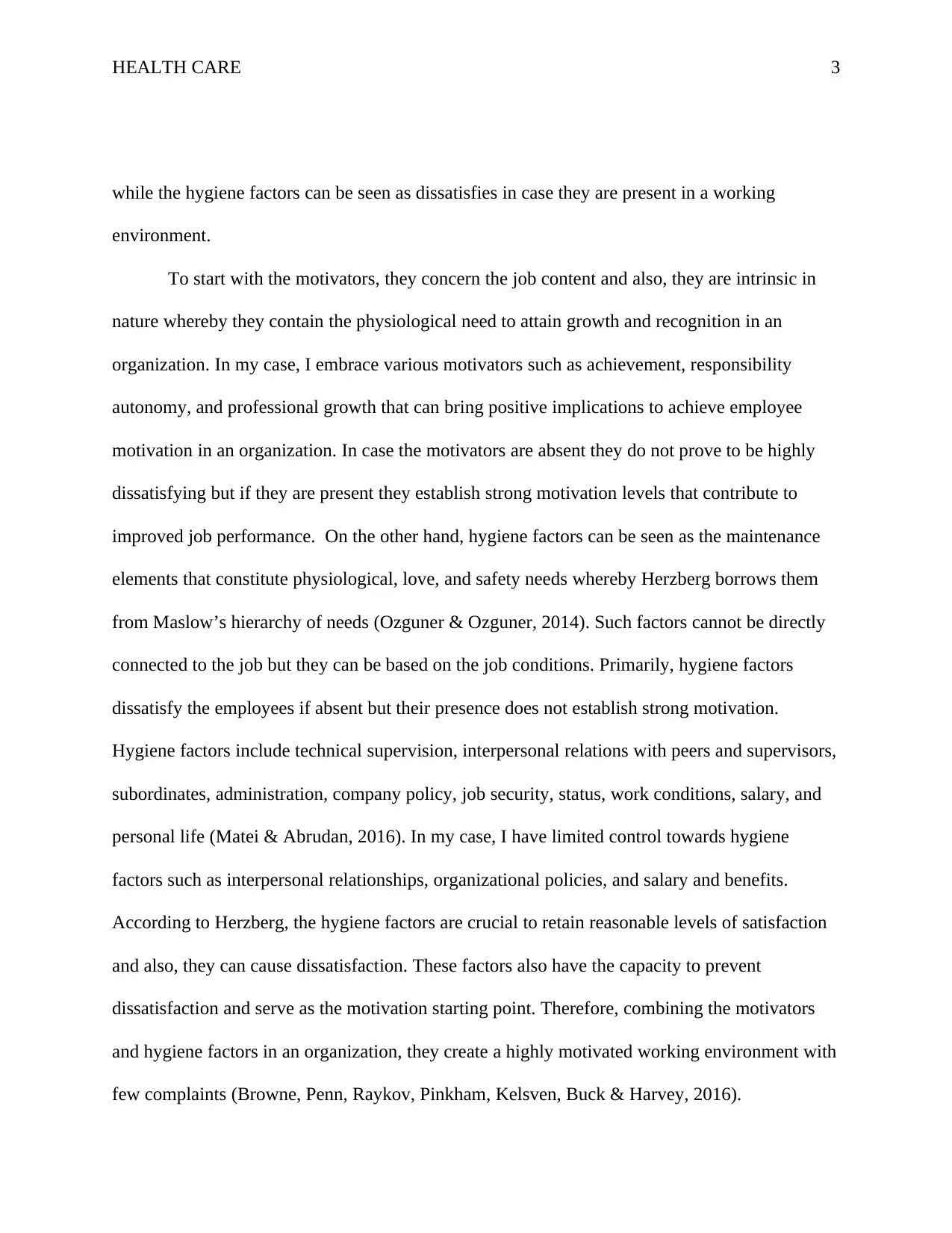
HEALTH CARE 3
while the hygiene factors can be seen as dissatisfies in case they are present in a working
environment.
To start with the motivators, they concern the job content and also, they are intrinsic in
nature whereby they contain the physiological need to attain growth and recognition in an
organization. In my case, I embrace various motivators such as achievement, responsibility
autonomy, and professional growth that can bring positive implications to achieve employee
motivation in an organization. In case the motivators are absent they do not prove to be highly
dissatisfying but if they are present they establish strong motivation levels that contribute to
improved job performance. On the other hand, hygiene factors can be seen as the maintenance
elements that constitute physiological, love, and safety needs whereby Herzberg borrows them
from Maslow’s hierarchy of needs (Ozguner & Ozguner, 2014). Such factors cannot be directly
connected to the job but they can be based on the job conditions. Primarily, hygiene factors
dissatisfy the employees if absent but their presence does not establish strong motivation.
Hygiene factors include technical supervision, interpersonal relations with peers and supervisors,
subordinates, administration, company policy, job security, status, work conditions, salary, and
personal life (Matei & Abrudan, 2016). In my case, I have limited control towards hygiene
factors such as interpersonal relationships, organizational policies, and salary and benefits.
According to Herzberg, the hygiene factors are crucial to retain reasonable levels of satisfaction
and also, they can cause dissatisfaction. These factors also have the capacity to prevent
dissatisfaction and serve as the motivation starting point. Therefore, combining the motivators
and hygiene factors in an organization, they create a highly motivated working environment with
few complaints (Browne, Penn, Raykov, Pinkham, Kelsven, Buck & Harvey, 2016).
while the hygiene factors can be seen as dissatisfies in case they are present in a working
environment.
To start with the motivators, they concern the job content and also, they are intrinsic in
nature whereby they contain the physiological need to attain growth and recognition in an
organization. In my case, I embrace various motivators such as achievement, responsibility
autonomy, and professional growth that can bring positive implications to achieve employee
motivation in an organization. In case the motivators are absent they do not prove to be highly
dissatisfying but if they are present they establish strong motivation levels that contribute to
improved job performance. On the other hand, hygiene factors can be seen as the maintenance
elements that constitute physiological, love, and safety needs whereby Herzberg borrows them
from Maslow’s hierarchy of needs (Ozguner & Ozguner, 2014). Such factors cannot be directly
connected to the job but they can be based on the job conditions. Primarily, hygiene factors
dissatisfy the employees if absent but their presence does not establish strong motivation.
Hygiene factors include technical supervision, interpersonal relations with peers and supervisors,
subordinates, administration, company policy, job security, status, work conditions, salary, and
personal life (Matei & Abrudan, 2016). In my case, I have limited control towards hygiene
factors such as interpersonal relationships, organizational policies, and salary and benefits.
According to Herzberg, the hygiene factors are crucial to retain reasonable levels of satisfaction
and also, they can cause dissatisfaction. These factors also have the capacity to prevent
dissatisfaction and serve as the motivation starting point. Therefore, combining the motivators
and hygiene factors in an organization, they create a highly motivated working environment with
few complaints (Browne, Penn, Raykov, Pinkham, Kelsven, Buck & Harvey, 2016).
⊘ This is a preview!⊘
Do you want full access?
Subscribe today to unlock all pages.

Trusted by 1+ million students worldwide
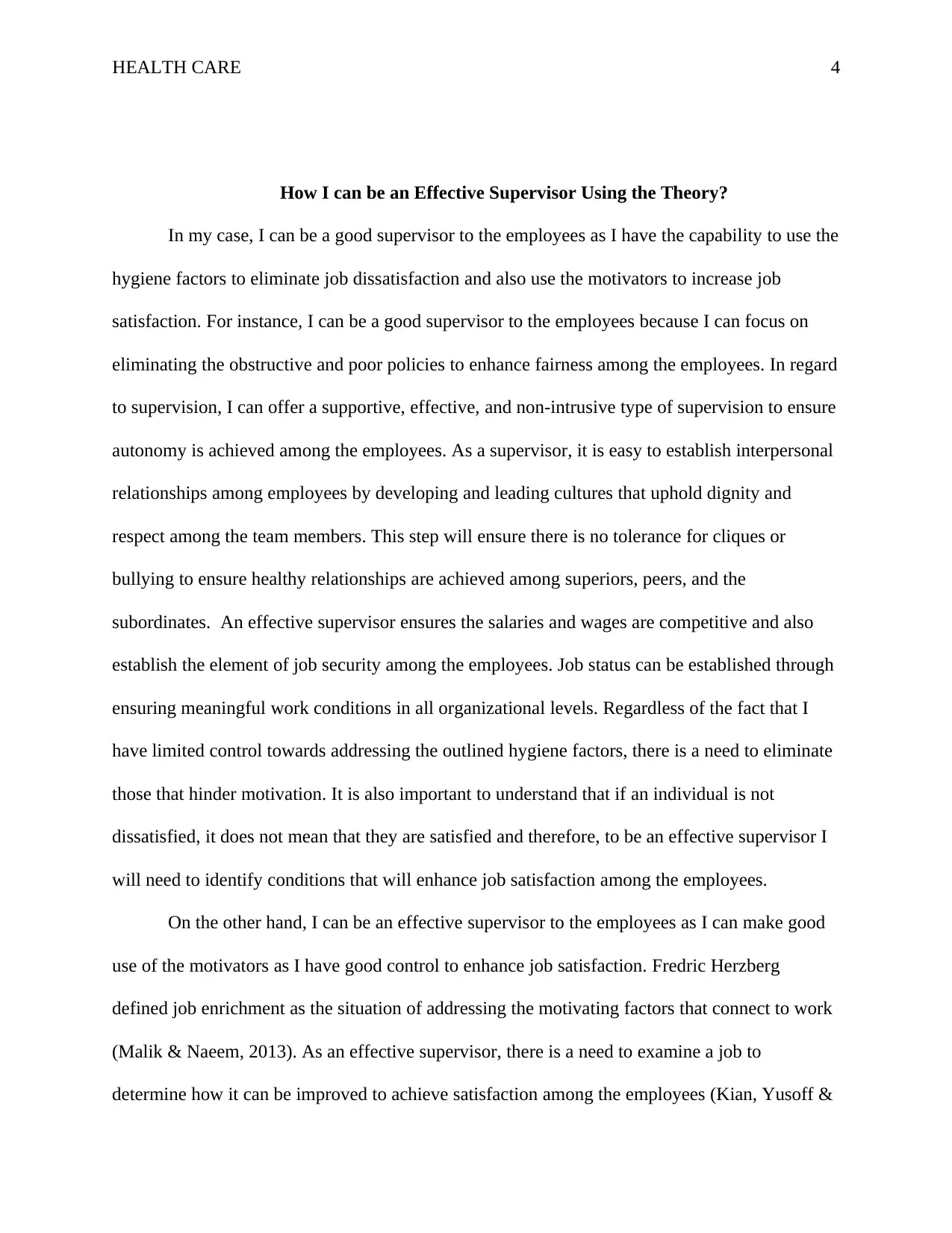
HEALTH CARE 4
How I can be an Effective Supervisor Using the Theory?
In my case, I can be a good supervisor to the employees as I have the capability to use the
hygiene factors to eliminate job dissatisfaction and also use the motivators to increase job
satisfaction. For instance, I can be a good supervisor to the employees because I can focus on
eliminating the obstructive and poor policies to enhance fairness among the employees. In regard
to supervision, I can offer a supportive, effective, and non-intrusive type of supervision to ensure
autonomy is achieved among the employees. As a supervisor, it is easy to establish interpersonal
relationships among employees by developing and leading cultures that uphold dignity and
respect among the team members. This step will ensure there is no tolerance for cliques or
bullying to ensure healthy relationships are achieved among superiors, peers, and the
subordinates. An effective supervisor ensures the salaries and wages are competitive and also
establish the element of job security among the employees. Job status can be established through
ensuring meaningful work conditions in all organizational levels. Regardless of the fact that I
have limited control towards addressing the outlined hygiene factors, there is a need to eliminate
those that hinder motivation. It is also important to understand that if an individual is not
dissatisfied, it does not mean that they are satisfied and therefore, to be an effective supervisor I
will need to identify conditions that will enhance job satisfaction among the employees.
On the other hand, I can be an effective supervisor to the employees as I can make good
use of the motivators as I have good control to enhance job satisfaction. Fredric Herzberg
defined job enrichment as the situation of addressing the motivating factors that connect to work
(Malik & Naeem, 2013). As an effective supervisor, there is a need to examine a job to
determine how it can be improved to achieve satisfaction among the employees (Kian, Yusoff &
How I can be an Effective Supervisor Using the Theory?
In my case, I can be a good supervisor to the employees as I have the capability to use the
hygiene factors to eliminate job dissatisfaction and also use the motivators to increase job
satisfaction. For instance, I can be a good supervisor to the employees because I can focus on
eliminating the obstructive and poor policies to enhance fairness among the employees. In regard
to supervision, I can offer a supportive, effective, and non-intrusive type of supervision to ensure
autonomy is achieved among the employees. As a supervisor, it is easy to establish interpersonal
relationships among employees by developing and leading cultures that uphold dignity and
respect among the team members. This step will ensure there is no tolerance for cliques or
bullying to ensure healthy relationships are achieved among superiors, peers, and the
subordinates. An effective supervisor ensures the salaries and wages are competitive and also
establish the element of job security among the employees. Job status can be established through
ensuring meaningful work conditions in all organizational levels. Regardless of the fact that I
have limited control towards addressing the outlined hygiene factors, there is a need to eliminate
those that hinder motivation. It is also important to understand that if an individual is not
dissatisfied, it does not mean that they are satisfied and therefore, to be an effective supervisor I
will need to identify conditions that will enhance job satisfaction among the employees.
On the other hand, I can be an effective supervisor to the employees as I can make good
use of the motivators as I have good control to enhance job satisfaction. Fredric Herzberg
defined job enrichment as the situation of addressing the motivating factors that connect to work
(Malik & Naeem, 2013). As an effective supervisor, there is a need to examine a job to
determine how it can be improved to achieve satisfaction among the employees (Kian, Yusoff &
Paraphrase This Document
Need a fresh take? Get an instant paraphrase of this document with our AI Paraphraser
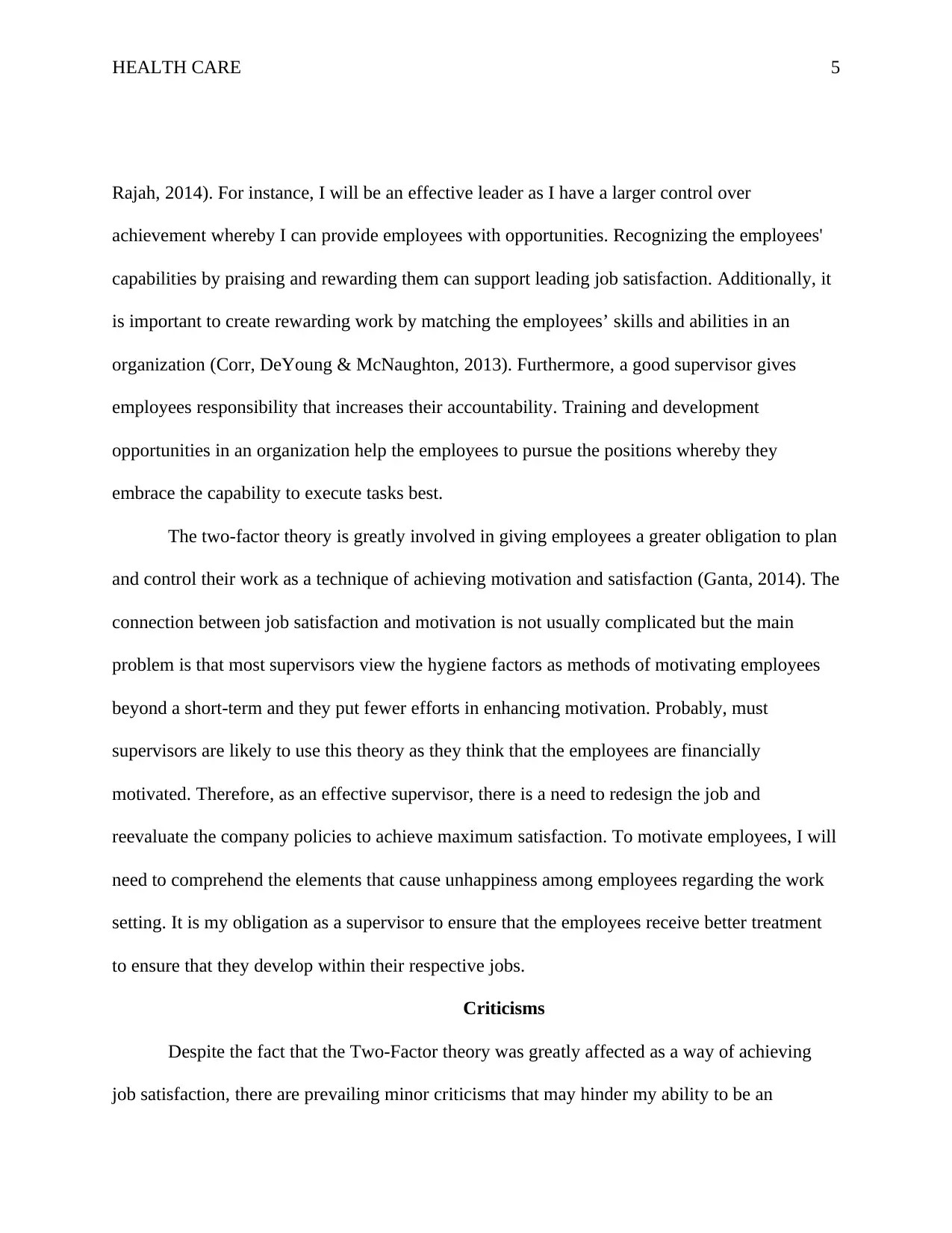
HEALTH CARE 5
Rajah, 2014). For instance, I will be an effective leader as I have a larger control over
achievement whereby I can provide employees with opportunities. Recognizing the employees'
capabilities by praising and rewarding them can support leading job satisfaction. Additionally, it
is important to create rewarding work by matching the employees’ skills and abilities in an
organization (Corr, DeYoung & McNaughton, 2013). Furthermore, a good supervisor gives
employees responsibility that increases their accountability. Training and development
opportunities in an organization help the employees to pursue the positions whereby they
embrace the capability to execute tasks best.
The two-factor theory is greatly involved in giving employees a greater obligation to plan
and control their work as a technique of achieving motivation and satisfaction (Ganta, 2014). The
connection between job satisfaction and motivation is not usually complicated but the main
problem is that most supervisors view the hygiene factors as methods of motivating employees
beyond a short-term and they put fewer efforts in enhancing motivation. Probably, must
supervisors are likely to use this theory as they think that the employees are financially
motivated. Therefore, as an effective supervisor, there is a need to redesign the job and
reevaluate the company policies to achieve maximum satisfaction. To motivate employees, I will
need to comprehend the elements that cause unhappiness among employees regarding the work
setting. It is my obligation as a supervisor to ensure that the employees receive better treatment
to ensure that they develop within their respective jobs.
Criticisms
Despite the fact that the Two-Factor theory was greatly affected as a way of achieving
job satisfaction, there are prevailing minor criticisms that may hinder my ability to be an
Rajah, 2014). For instance, I will be an effective leader as I have a larger control over
achievement whereby I can provide employees with opportunities. Recognizing the employees'
capabilities by praising and rewarding them can support leading job satisfaction. Additionally, it
is important to create rewarding work by matching the employees’ skills and abilities in an
organization (Corr, DeYoung & McNaughton, 2013). Furthermore, a good supervisor gives
employees responsibility that increases their accountability. Training and development
opportunities in an organization help the employees to pursue the positions whereby they
embrace the capability to execute tasks best.
The two-factor theory is greatly involved in giving employees a greater obligation to plan
and control their work as a technique of achieving motivation and satisfaction (Ganta, 2014). The
connection between job satisfaction and motivation is not usually complicated but the main
problem is that most supervisors view the hygiene factors as methods of motivating employees
beyond a short-term and they put fewer efforts in enhancing motivation. Probably, must
supervisors are likely to use this theory as they think that the employees are financially
motivated. Therefore, as an effective supervisor, there is a need to redesign the job and
reevaluate the company policies to achieve maximum satisfaction. To motivate employees, I will
need to comprehend the elements that cause unhappiness among employees regarding the work
setting. It is my obligation as a supervisor to ensure that the employees receive better treatment
to ensure that they develop within their respective jobs.
Criticisms
Despite the fact that the Two-Factor theory was greatly affected as a way of achieving
job satisfaction, there are prevailing minor criticisms that may hinder my ability to be an
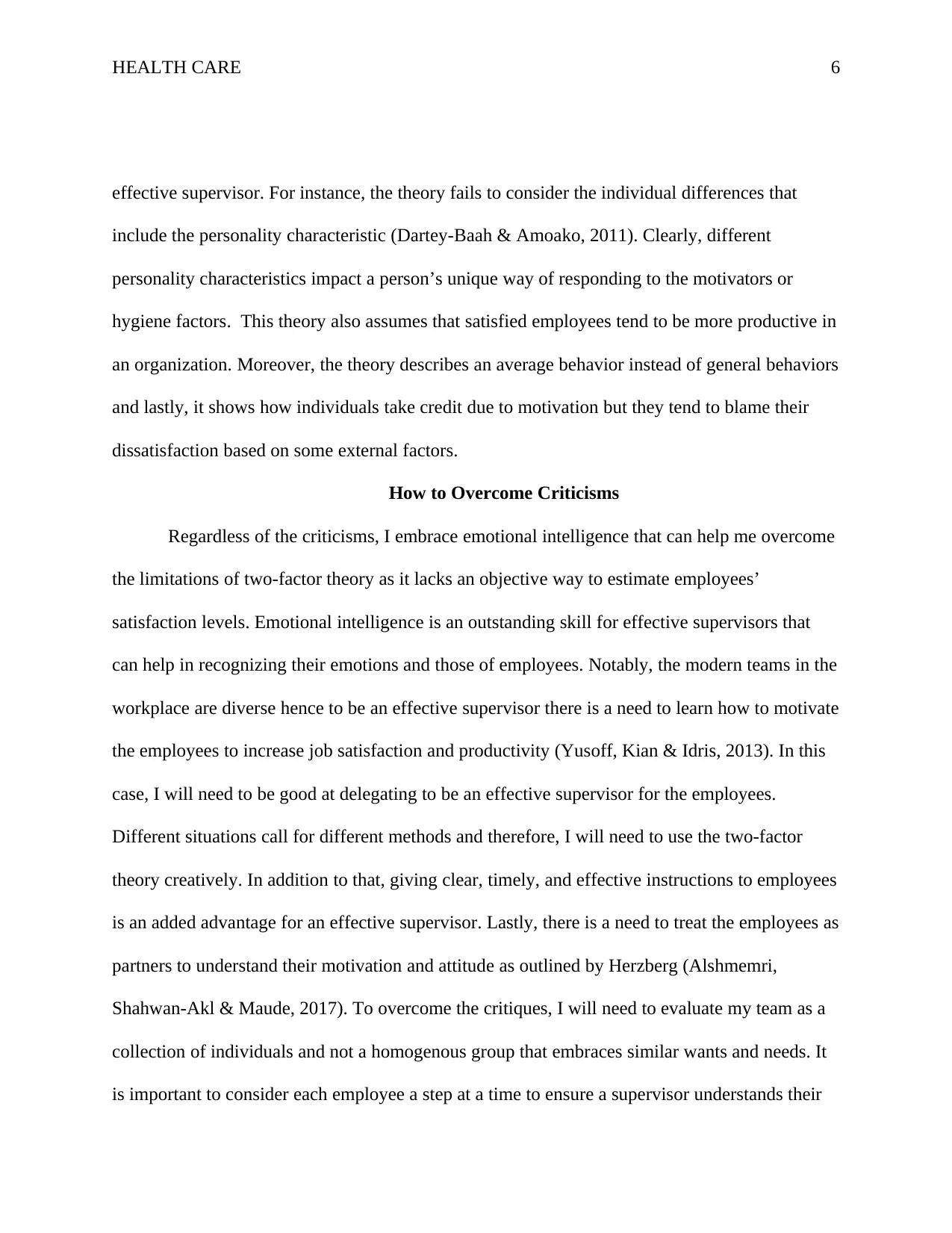
HEALTH CARE 6
effective supervisor. For instance, the theory fails to consider the individual differences that
include the personality characteristic (Dartey-Baah & Amoako, 2011). Clearly, different
personality characteristics impact a person’s unique way of responding to the motivators or
hygiene factors. This theory also assumes that satisfied employees tend to be more productive in
an organization. Moreover, the theory describes an average behavior instead of general behaviors
and lastly, it shows how individuals take credit due to motivation but they tend to blame their
dissatisfaction based on some external factors.
How to Overcome Criticisms
Regardless of the criticisms, I embrace emotional intelligence that can help me overcome
the limitations of two-factor theory as it lacks an objective way to estimate employees’
satisfaction levels. Emotional intelligence is an outstanding skill for effective supervisors that
can help in recognizing their emotions and those of employees. Notably, the modern teams in the
workplace are diverse hence to be an effective supervisor there is a need to learn how to motivate
the employees to increase job satisfaction and productivity (Yusoff, Kian & Idris, 2013). In this
case, I will need to be good at delegating to be an effective supervisor for the employees.
Different situations call for different methods and therefore, I will need to use the two-factor
theory creatively. In addition to that, giving clear, timely, and effective instructions to employees
is an added advantage for an effective supervisor. Lastly, there is a need to treat the employees as
partners to understand their motivation and attitude as outlined by Herzberg (Alshmemri,
Shahwan-Akl & Maude, 2017). To overcome the critiques, I will need to evaluate my team as a
collection of individuals and not a homogenous group that embraces similar wants and needs. It
is important to consider each employee a step at a time to ensure a supervisor understands their
effective supervisor. For instance, the theory fails to consider the individual differences that
include the personality characteristic (Dartey-Baah & Amoako, 2011). Clearly, different
personality characteristics impact a person’s unique way of responding to the motivators or
hygiene factors. This theory also assumes that satisfied employees tend to be more productive in
an organization. Moreover, the theory describes an average behavior instead of general behaviors
and lastly, it shows how individuals take credit due to motivation but they tend to blame their
dissatisfaction based on some external factors.
How to Overcome Criticisms
Regardless of the criticisms, I embrace emotional intelligence that can help me overcome
the limitations of two-factor theory as it lacks an objective way to estimate employees’
satisfaction levels. Emotional intelligence is an outstanding skill for effective supervisors that
can help in recognizing their emotions and those of employees. Notably, the modern teams in the
workplace are diverse hence to be an effective supervisor there is a need to learn how to motivate
the employees to increase job satisfaction and productivity (Yusoff, Kian & Idris, 2013). In this
case, I will need to be good at delegating to be an effective supervisor for the employees.
Different situations call for different methods and therefore, I will need to use the two-factor
theory creatively. In addition to that, giving clear, timely, and effective instructions to employees
is an added advantage for an effective supervisor. Lastly, there is a need to treat the employees as
partners to understand their motivation and attitude as outlined by Herzberg (Alshmemri,
Shahwan-Akl & Maude, 2017). To overcome the critiques, I will need to evaluate my team as a
collection of individuals and not a homogenous group that embraces similar wants and needs. It
is important to consider each employee a step at a time to ensure a supervisor understands their
⊘ This is a preview!⊘
Do you want full access?
Subscribe today to unlock all pages.

Trusted by 1+ million students worldwide
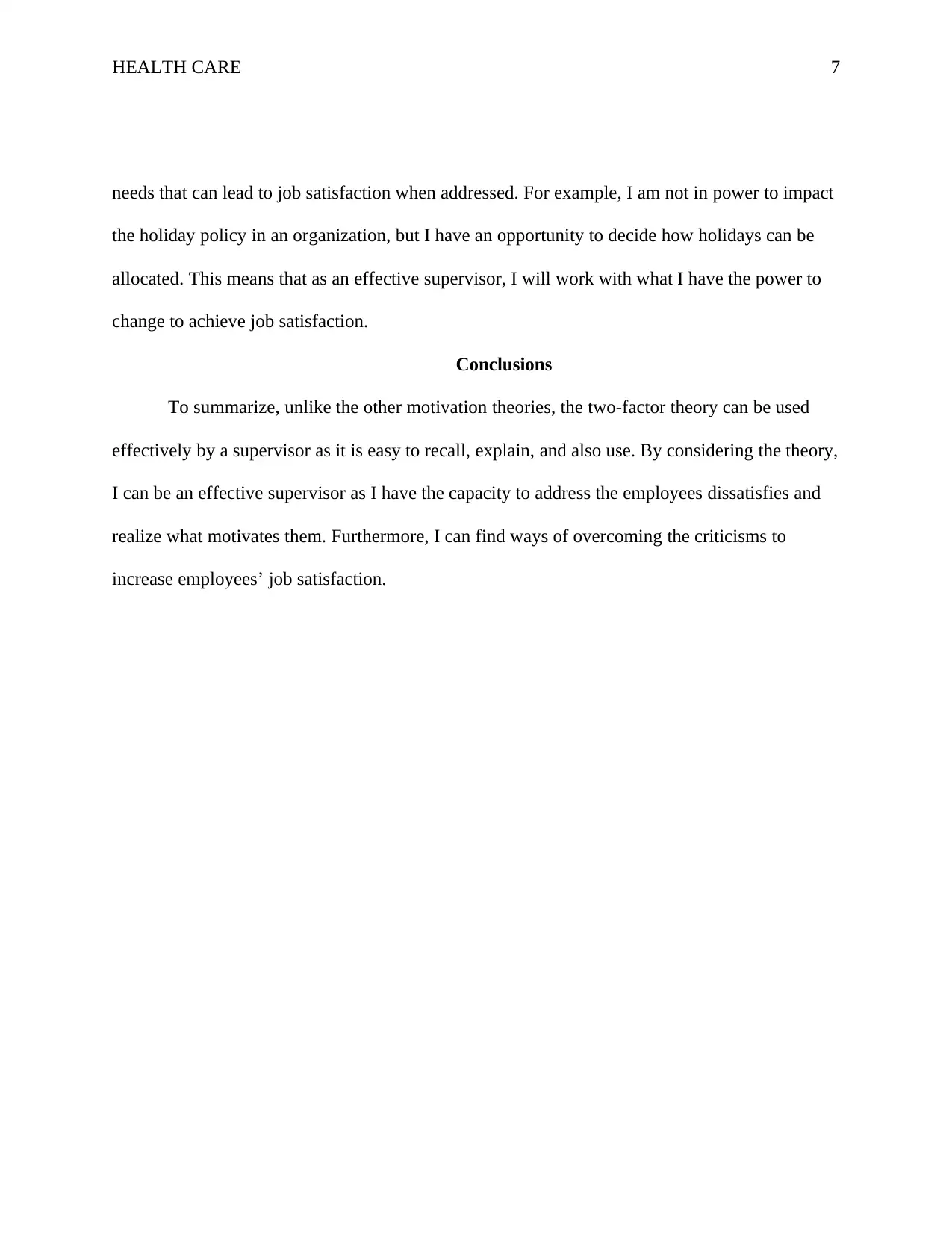
HEALTH CARE 7
needs that can lead to job satisfaction when addressed. For example, I am not in power to impact
the holiday policy in an organization, but I have an opportunity to decide how holidays can be
allocated. This means that as an effective supervisor, I will work with what I have the power to
change to achieve job satisfaction.
Conclusions
To summarize, unlike the other motivation theories, the two-factor theory can be used
effectively by a supervisor as it is easy to recall, explain, and also use. By considering the theory,
I can be an effective supervisor as I have the capacity to address the employees dissatisfies and
realize what motivates them. Furthermore, I can find ways of overcoming the criticisms to
increase employees’ job satisfaction.
needs that can lead to job satisfaction when addressed. For example, I am not in power to impact
the holiday policy in an organization, but I have an opportunity to decide how holidays can be
allocated. This means that as an effective supervisor, I will work with what I have the power to
change to achieve job satisfaction.
Conclusions
To summarize, unlike the other motivation theories, the two-factor theory can be used
effectively by a supervisor as it is easy to recall, explain, and also use. By considering the theory,
I can be an effective supervisor as I have the capacity to address the employees dissatisfies and
realize what motivates them. Furthermore, I can find ways of overcoming the criticisms to
increase employees’ job satisfaction.
Paraphrase This Document
Need a fresh take? Get an instant paraphrase of this document with our AI Paraphraser
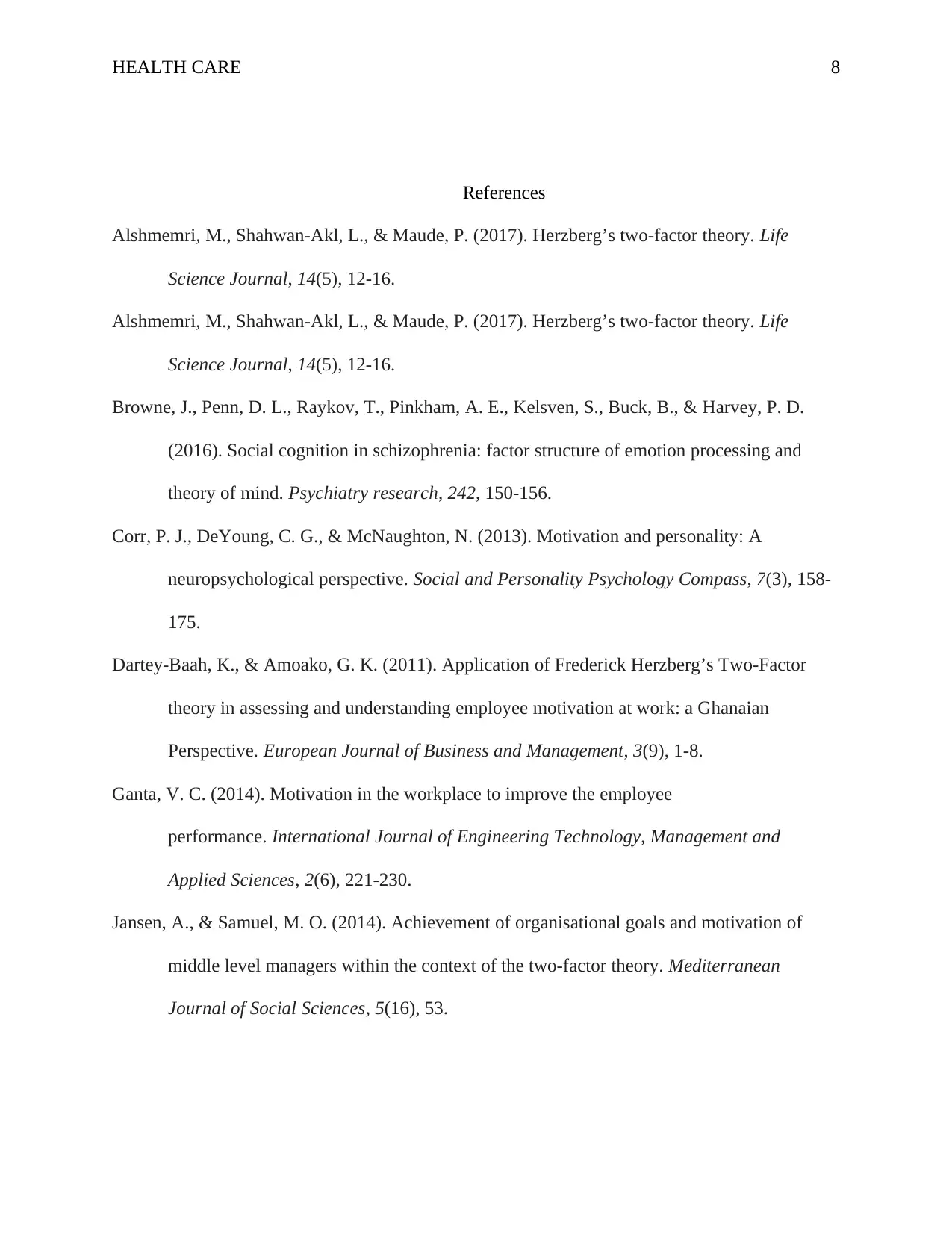
HEALTH CARE 8
References
Alshmemri, M., Shahwan-Akl, L., & Maude, P. (2017). Herzberg’s two-factor theory. Life
Science Journal, 14(5), 12-16.
Alshmemri, M., Shahwan-Akl, L., & Maude, P. (2017). Herzberg’s two-factor theory. Life
Science Journal, 14(5), 12-16.
Browne, J., Penn, D. L., Raykov, T., Pinkham, A. E., Kelsven, S., Buck, B., & Harvey, P. D.
(2016). Social cognition in schizophrenia: factor structure of emotion processing and
theory of mind. Psychiatry research, 242, 150-156.
Corr, P. J., DeYoung, C. G., & McNaughton, N. (2013). Motivation and personality: A
neuropsychological perspective. Social and Personality Psychology Compass, 7(3), 158-
175.
Dartey-Baah, K., & Amoako, G. K. (2011). Application of Frederick Herzberg’s Two-Factor
theory in assessing and understanding employee motivation at work: a Ghanaian
Perspective. European Journal of Business and Management, 3(9), 1-8.
Ganta, V. C. (2014). Motivation in the workplace to improve the employee
performance. International Journal of Engineering Technology, Management and
Applied Sciences, 2(6), 221-230.
Jansen, A., & Samuel, M. O. (2014). Achievement of organisational goals and motivation of
middle level managers within the context of the two-factor theory. Mediterranean
Journal of Social Sciences, 5(16), 53.
References
Alshmemri, M., Shahwan-Akl, L., & Maude, P. (2017). Herzberg’s two-factor theory. Life
Science Journal, 14(5), 12-16.
Alshmemri, M., Shahwan-Akl, L., & Maude, P. (2017). Herzberg’s two-factor theory. Life
Science Journal, 14(5), 12-16.
Browne, J., Penn, D. L., Raykov, T., Pinkham, A. E., Kelsven, S., Buck, B., & Harvey, P. D.
(2016). Social cognition in schizophrenia: factor structure of emotion processing and
theory of mind. Psychiatry research, 242, 150-156.
Corr, P. J., DeYoung, C. G., & McNaughton, N. (2013). Motivation and personality: A
neuropsychological perspective. Social and Personality Psychology Compass, 7(3), 158-
175.
Dartey-Baah, K., & Amoako, G. K. (2011). Application of Frederick Herzberg’s Two-Factor
theory in assessing and understanding employee motivation at work: a Ghanaian
Perspective. European Journal of Business and Management, 3(9), 1-8.
Ganta, V. C. (2014). Motivation in the workplace to improve the employee
performance. International Journal of Engineering Technology, Management and
Applied Sciences, 2(6), 221-230.
Jansen, A., & Samuel, M. O. (2014). Achievement of organisational goals and motivation of
middle level managers within the context of the two-factor theory. Mediterranean
Journal of Social Sciences, 5(16), 53.
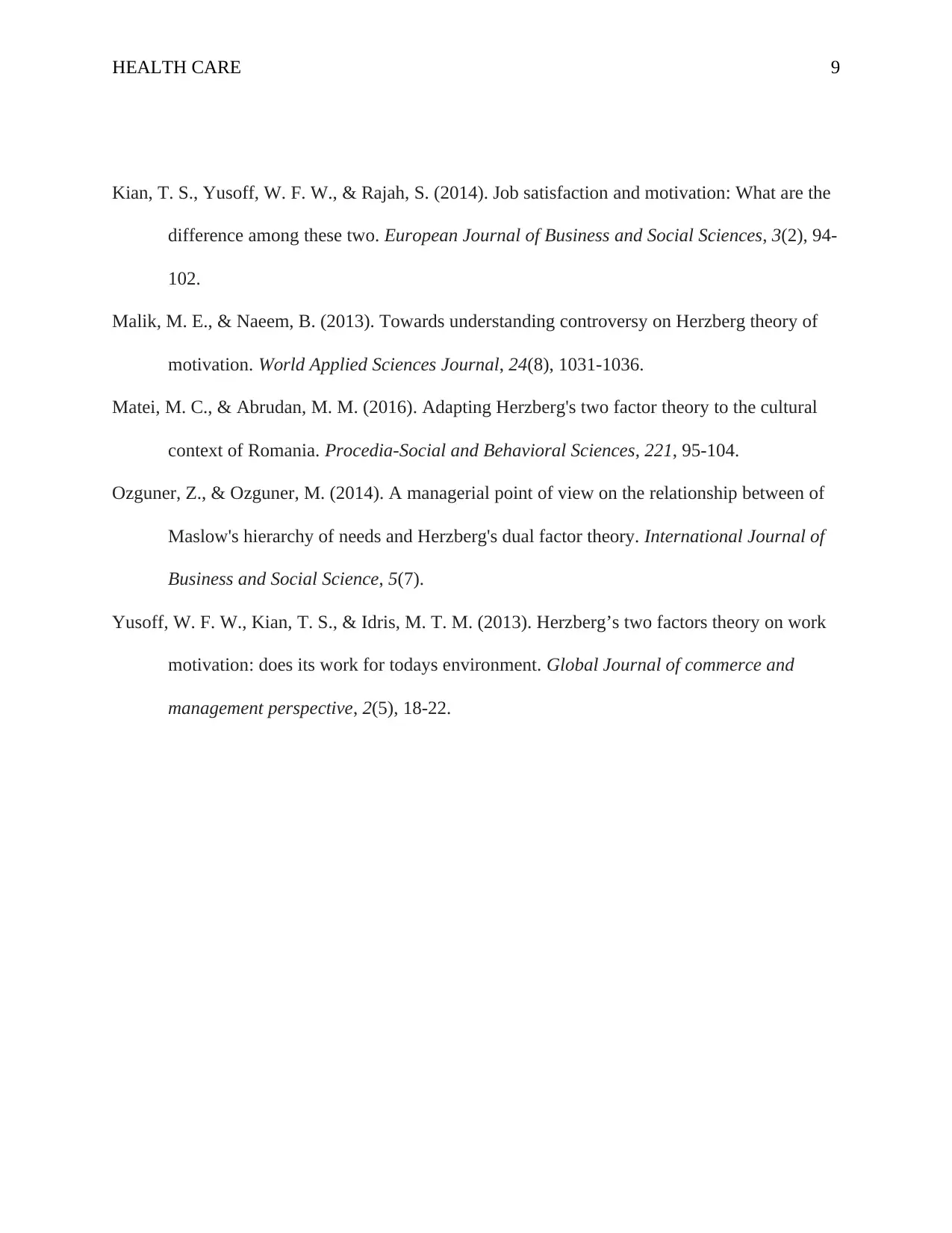
HEALTH CARE 9
Kian, T. S., Yusoff, W. F. W., & Rajah, S. (2014). Job satisfaction and motivation: What are the
difference among these two. European Journal of Business and Social Sciences, 3(2), 94-
102.
Malik, M. E., & Naeem, B. (2013). Towards understanding controversy on Herzberg theory of
motivation. World Applied Sciences Journal, 24(8), 1031-1036.
Matei, M. C., & Abrudan, M. M. (2016). Adapting Herzberg's two factor theory to the cultural
context of Romania. Procedia-Social and Behavioral Sciences, 221, 95-104.
Ozguner, Z., & Ozguner, M. (2014). A managerial point of view on the relationship between of
Maslow's hierarchy of needs and Herzberg's dual factor theory. International Journal of
Business and Social Science, 5(7).
Yusoff, W. F. W., Kian, T. S., & Idris, M. T. M. (2013). Herzberg’s two factors theory on work
motivation: does its work for todays environment. Global Journal of commerce and
management perspective, 2(5), 18-22.
Kian, T. S., Yusoff, W. F. W., & Rajah, S. (2014). Job satisfaction and motivation: What are the
difference among these two. European Journal of Business and Social Sciences, 3(2), 94-
102.
Malik, M. E., & Naeem, B. (2013). Towards understanding controversy on Herzberg theory of
motivation. World Applied Sciences Journal, 24(8), 1031-1036.
Matei, M. C., & Abrudan, M. M. (2016). Adapting Herzberg's two factor theory to the cultural
context of Romania. Procedia-Social and Behavioral Sciences, 221, 95-104.
Ozguner, Z., & Ozguner, M. (2014). A managerial point of view on the relationship between of
Maslow's hierarchy of needs and Herzberg's dual factor theory. International Journal of
Business and Social Science, 5(7).
Yusoff, W. F. W., Kian, T. S., & Idris, M. T. M. (2013). Herzberg’s two factors theory on work
motivation: does its work for todays environment. Global Journal of commerce and
management perspective, 2(5), 18-22.
⊘ This is a preview!⊘
Do you want full access?
Subscribe today to unlock all pages.

Trusted by 1+ million students worldwide
1 out of 9
Related Documents
Your All-in-One AI-Powered Toolkit for Academic Success.
+13062052269
info@desklib.com
Available 24*7 on WhatsApp / Email
![[object Object]](/_next/static/media/star-bottom.7253800d.svg)
Unlock your academic potential
Copyright © 2020–2026 A2Z Services. All Rights Reserved. Developed and managed by ZUCOL.





